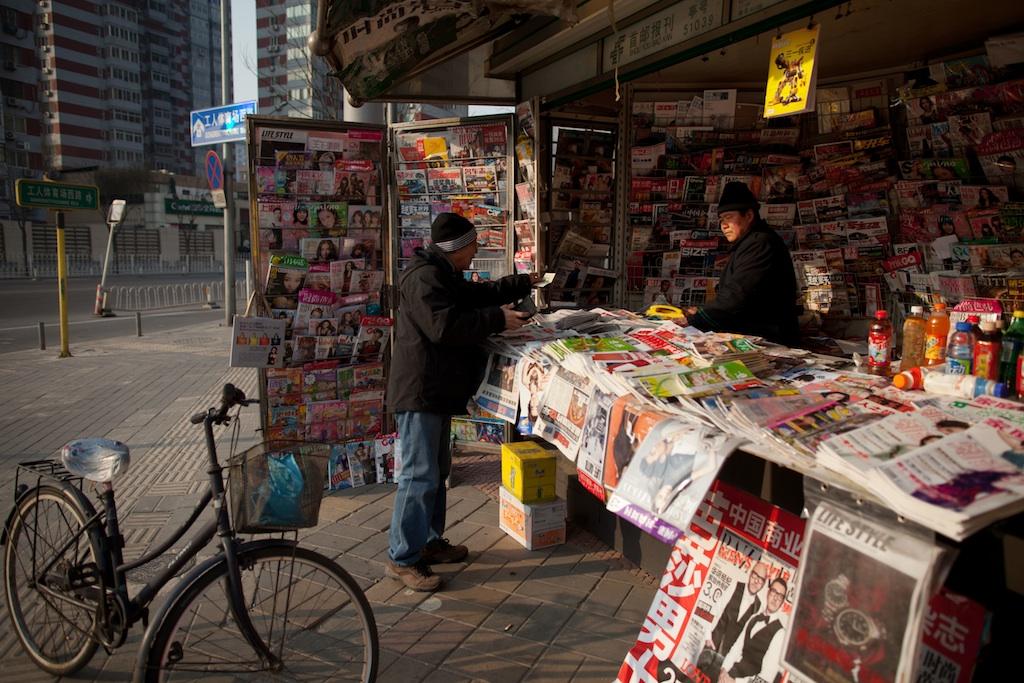Chinese media crackdown
A media crackdown in China means trouble for some of the more outspoken Chinese newspapers.
HONG KONG – Heads are rolling at some of China’s most outspoken newspapers, sending a chilling signal to mainland journalists to stick to the party line ahead of the country’s tense political transition this fall.
This week, in quick back-to-back moves, the editor-in-chief of Guangzhou’s New Express newspaper was sacked, and the publisher and deputy editor-in-chief of Shanghai’s Oriental Morning Post were pulled from their positions.
The same day as the announcement, the editorial page of New Express disappeared, along with the paper’s international and national news coverage. The number of local stories was significantly beefed up.
The two newspapers stand out among China’s commercial outlets, which walk a fine line between earning a profit and avoiding the anger of state authorities. Known for its bold front pages, New Express comes from the relatively more liberal media environment of Guangdong province. Meanwhile, the Oriental Morning Post has a particular reputation for strong reporting and feisty headlines: the day after Sichuan province’s 2008 earthquake, the newspaper published a black front-page with the words, “8,533 dead.”
The public firings of the heads of these two papers has reverberated among journalists as a dramatic message to increase self-censorship before the all-important meeting of the Communist Party congress this autumn.
“The leadership transition has a lot to do with it,” says Jeremy Goldkorn, founder of Danwei, a blog on Chinese media. “Everyone is sitting on the fence in China until that happens.”
More from GlobalPost: China or Russia: Who's the bigger problem?
Still, the exact reasons for the dismissals are not clear.
Many speculate that the editor of New Express was punished for running a profile of China’s next generation of leaders — including presumptive president Xi Jinping — earlier this month. But the story was simply reprinted from another Chinese newspaper. In fact, not only was the other newspaper not reprimanded, but as David Bandurski of the China Media Project pointed out, the original article is still available on its website.
The outgoing editor of New Express, Lin Fumin, also gave no clue as to the reason for his sacking. In a cryptic farewell note, he wrote on his microblog that he was getting to “return home” to his “roots” at another newspaper, according to a translation by the China Media Project. He concluded, “today I’ve finally gotten my wish.”
Things are no clearer at the Oriental Morning Post. On the one hand, the piece that allegedly caused the publisher’s firing was an inoffensive interview with an economist who argued that China’s state-owned companies should have a less dominant place in the economy. And the paper’s deputy editor-in-chief, Sun Jian, was apparently suspended for tweeting a picture of a book featuring interviews with the mayor of Beijing during the Tiananmen Square massacres of 1989.
“So what is really going on? The bottom line, we don’t know,” Bandurski writes.
Whatever the immediate cause, analysts believe that the orders to crack came from local party bosses eager to keep a lid on negative press. The Shanghai party boss, Yu Zhengsheng, is expected to join the first rank of the Communist leadership this fall, as is Wang Yang, the party boss in Guangdong province. (Wang, ironically enough, is seen as the figurehead for liberal reform in China.)
More from GlobalPost: In China, infrastructure attempts crumble
“There's been lots of social unrest and protests in Guangdong recently, which has attracted Beijing's attention,” Zhu Jianguo, an independent commentator, told the South China Morning Post. “It's possible that Wang decided to further tighten control of the media to ensure there's zero trouble during the last few months of his tenure.”
In addition to protecting their political fortunes, the party bosses may be responding to signals from the center. In May, the state-owned Beijing Daily published an editorial slamming commercial newspapers such as New Express and Oriental Morning Post for following Western practices in journalism. In particular, they criticized reporting on scandals relating to “tofu architecture” — dangerously shoddy buildings — and toxic chemicals found in food.
Even if the motives for the purge stay hazy, their effect is clear enough: journalists will become more circumspect. Already, censors have issued a rule banning coverage of the one-year anniversary of the high-speed train crash that killed 40 people in Wenzhou. Many expect that enforcement will be strict.
“I don’t predict it getting better anytime soon,” says Goldkorn. “Most people would say that nothing is going to change until well after the leadership transition. Even then, who knows? Nothing Xi Jingping has said suggests that he’s going to want to open up the media all of a sudden.”
More from GlobalPost: Is it time for China to abandon the one-child policy?
The story you just read is accessible and free to all because thousands of listeners and readers contribute to our nonprofit newsroom. We go deep to bring you the human-centered international reporting that you know you can trust. To do this work and to do it well, we rely on the support of our listeners. If you appreciated our coverage this year, if there was a story that made you pause or a song that moved you, would you consider making a gift to sustain our work through 2024 and beyond?
